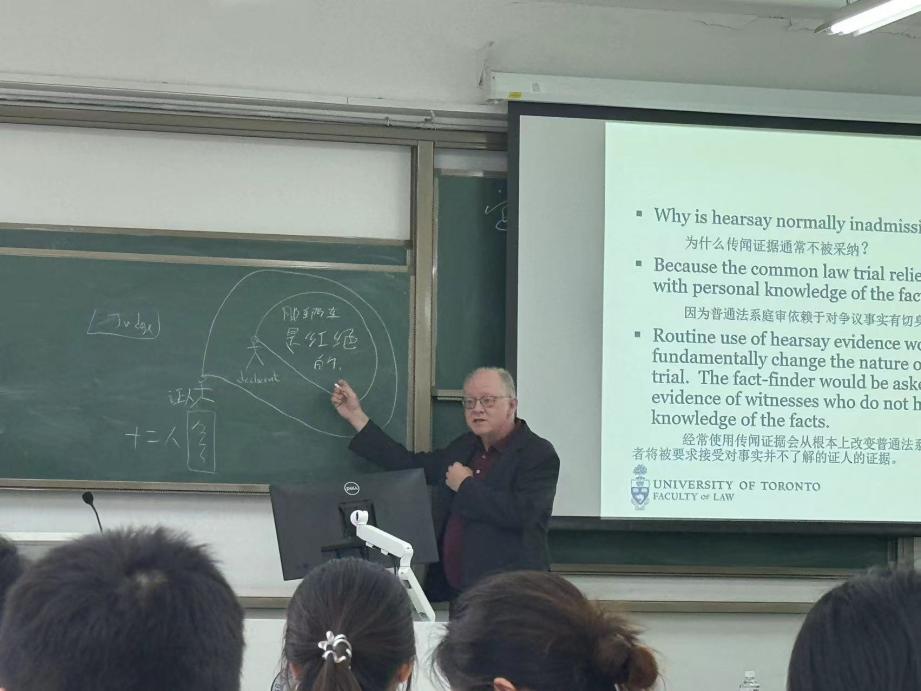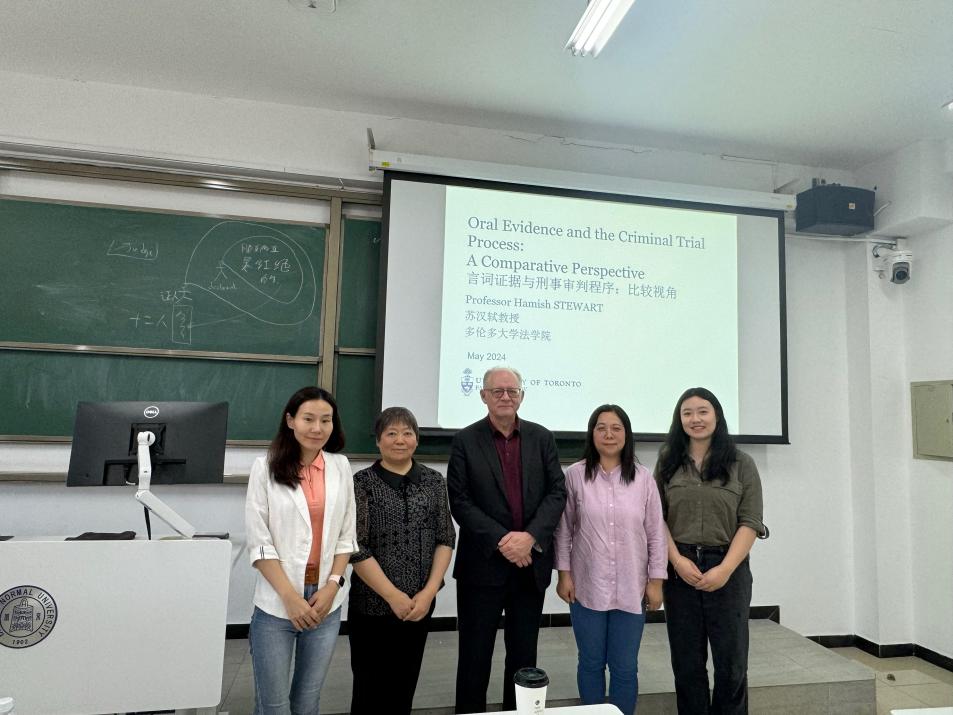

On May 15, the 7th session of the BNU Procedural Law Scholar Lecture Series was successfully conducted in Room 202 of Teaching Building 7 at Beijing Normal University. The lecture was delivered by Hamish Stewart, a professor from the University of Toronto Law School, under the auspices of "Oral Evidence and the Criminal Trial Process." Professor Guo Zhiyuan, Vice Dean of the School of Criminal Justice at China University of Political Science and Law, graced the event as a panelist. The lecture drew an audience of over 80 participants, including Professor Shi Limei, Associate Professor Yang Chao, and Postdoctoral Fellow Yan Zemin, along with a contingent of doctoral, master's, and undergraduate students specializing in Criminal Procedure Law from the Beijing Normal University Law School. The lecture was moderated by Professor Shi Limei.
At the outset of the lecture, Professor Shi Limei presented a comprehensive overview of Professor Hamish Stewart's distinguished career and extended a warm welcome to all the scholars in attendance. Following this introduction, Professor Hamish Stewart delivered an illuminating discourse on the interplay between verbal evidence and criminal trial procedures, offering a comparative perspective on the subject.
During his lecture, Professor Hamish Stewart delved deeply into the parallels and divergences in the employment of verbal evidence within the frameworks of common law and civil law criminal trials. He scrutinized the strengths and weaknesses of verbal evidence, beginning with an exposition of the two distinct trial procedures—common law and civil law. He elaborated on the hallmarks of common law trial procedures, such as their adversarial nature, the primacy of oral testimony, and the pivotal role judges play in the evaluation of evidence. His focus included an examination of the hearsay evidence exclusionary rule, the rationale behind the general reluctance to admit hearsay evidence in common law systems, and the assessment of witness credibility.
Illustrating with the example of France, Professor Hamish Stewart then highlighted the conventional interrogation and case-based attributes of criminal procedures under the civil law system, as well as their significant oral components. Building on this foundation, he further investigated the function of verbal evidence in criminal trials, discussing its advantages and the challenges it poses in terms of reliability and equity.
In conclusion, Professor Hamish Stewart synthesized insights from both common law and civil law perspectives, drawing on social science evidence to articulate some tentative findings: while verbal evidence presented in court may not inherently possess greater reliability than other forms of evidence, its delivery does afford the defendant a crucial opportunity to challenge the prosecution's case. He suggested that perhaps the optimal approach is to integrate pre-prepared evidence with oral testimony.

Panelist Professor Guo Zhiyuan concurred with the insights presented by Professor Hamish Stewart, noting that both legal traditions place a significant premium on verbal evidence, albeit to varying extents. In the adversarial proceedings characteristic of the common law system, the oratory component stands out as its pivotal characteristic. Conversely, while the civil law system is grounded in an inquisitorial approach, it nonetheless leans heavily on case files and indeed underscores the value of verbal evidence. Additionally, Professor Guo Zhiyuan highlighted that the notion of a witness in China does not align with the concept as understood in Anglo-American evidence law, where the term encompasses not only traditional witnesses but also defendants, victims, experts, and others. He also drew attention to the disparities in the application of witness testimony between China and foreign jurisdictions, noting the absence of a hearsay exclusion rule in China. This lecture, he underscored, offers invaluable insights for shaping the framework of witness testimony and associated evidence rules within China's legal system.
As the lecture concluded, Professor Shi Limei remarked that Professor Hamish Stewart had furnished the students with profound understandings of the critical role verbal evidence plays in criminal trials, viewed through the lens of comparative law. He acknowledged that China's regulations regarding verbal evidence in criminal proceedings are in need of refinement and that the journey ahead is a lengthy one. Professor Shi Limei expressed his hope that the students would seize the opportunity presented by Professor Hamish Stewart's lecture to delve into the study and research of these matters with an open and rigorous mindset, contributing to the development and enhancement of witness testimony and pertinent evidence rules in China.

Transcript Editor: Zhu Meilin
